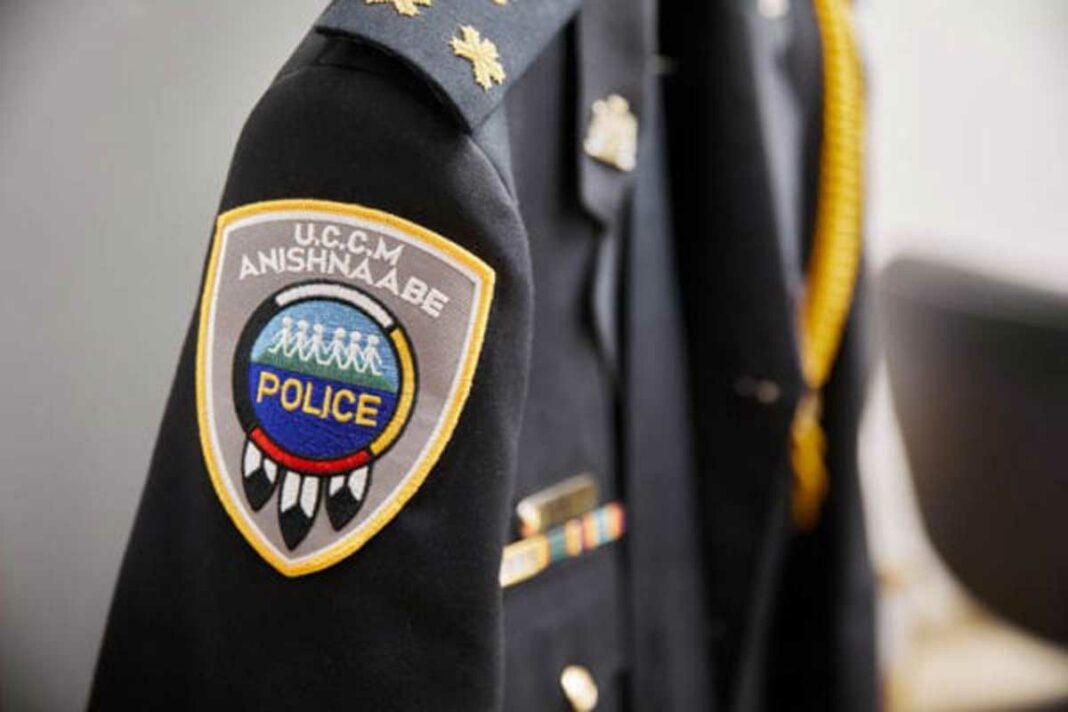ONTARIO—The United Chiefs and Councils of Manitoulin Anishinaabe Police Service (UCCM APS) is one of nine First Nations police services to have filed a complaint to the Canadian Human Rights Tribunal (CHRT) on the chronic underfunding of their police service. The Island police service, represented by the Indigenous Police Chiefs of Ontario (IPCO), was one of three First Nations police services that launched the complaint saying that federal government underfunding is deliberate and willful and amounts to discrimination. The Wiikwemkoong Tribal Police Services supports the complaint on an intervenor basis.
“Yes, the UCCM Police is one of three First Nation police forces that launched the complaint and one of the three who are actively involved,” said James Killeen, chief of police for the UCCM Police. Along with the UCCM APS, the other two are the Treaty Three Police Service and the Anishinabek Police Service. The Wikwemikong Tribal Police Service is one of the other six that are supporting the suit.
“The UCCM APS was also offered a 14-officer increase,” said Mr. Killeen. “UCCM just renewed part of its previous agreement (2019-2023) which enabled them to currently hire five officers. However, there are a number of issues affecting not only UCCM, but all First Nations police services in Ontario and across Canada. These issues are why UCCM joined in the (IPCO) CHRT complaint to fight for a much more substantial funding increase for needed personnel, sworn and civilian, new headquarters, equipment, infrastructure.”
“From a local standpoint in this CHRT complaint, currently UCCM APS covers six communities (Aundeck Omni Kaning, M’Chigeeng, Sheguiandah, Sheshegwaning, Whitefish River and Zhiibaahaasing), covering over hundreds of kilometres on back rural roads,” said Police Chief Killen. “The current staffing model makes it impossible for UCCM Police to attend to their communities in a safe time.”
Chief of Police Killeen explained that in September 2022, the United Chiefs and Councils of Mnidoo Mnising (UCCMM) chiefs (Chief Patsy Corbiere, Chief Linda Debassige, Chief Elvis Mishibinijima, Chief Irene Kells, Chief Alana Endanawas and now Chief Rodney Nahwegahbow), the Chief of Police of UCCM, UCCMM Tribal Council and the UCCM Police Commission all unanimously agreed that the UCCM Police were unsustainable with their current funding and would be unable to grow to meet the communities wants and needs. The chiefs all signed a band council resolution requesting substantial increases in funding to assist the UCCM APS to grow and to provide safe, equitable and adequate policing as well as make it progressive and evolving. This resolution has now been included in the CHRT complaint filed by IPCO.
“The UCCMM communities have seen substantial increases in criminal activity from crime groups from outside our area,” explained Police Chief Killeen. “In 2021 Chief Linda Debassige declared a state of emergency due to the massive increase in opioid related deaths, not just on the First Nation but on Manitoulin Island as a whole, which was directly related to illicit drug trafficking.”
“In 2022, UCCM APS had two murders and four attempted murders investigated,” said Police Chief Killeen. “Both murders and two of the four attempt murders were related to the drug trade industry and involved people from the Greater Toronto Area (GTA) who attended our communities specifically for financial gain. Two murders in one year put UCCM APS in one of the highest crime severity indexes in the province. In comparison, Greater Sudbury had a record nine murders in 2022 within a population of 160,000 people while UCCMM communities experienced two murders in a population of approximately 3,000 people. Joint Force Drug Enforcement ‘Project Hewson’ (Ontario Provincial Police and UCCM APS) saw substantial arrests involving members from the GTA who were caught trafficking large amounts of fentanyl and cocaine to undercover officers, which showed that all Manitoulin Island communities were saturated with illicit and dangerous drugs through criminals coming to the area strictly for profit.”
Police Chief Killeen outlined some of the issues that need to be addressed due to the current lack of funding. They include personnel and call time response. “With current officer staffing, it is impossible to respond to any community in an appropriate and safe time frame. Distances from the police headquarters in M’Chigeeng to the other five First Nation communities (AOK 22.8 km/17 minutes, Sheguiandah 23.9 km/23 minutes, Sheshegwaning 79.6 km/one hour, Whitefish River 59.2km/49 minutes, Zhiibaahaasing 86.7 km/I hour 10 minutes, and from Whitefish River to Zhiibaahaasing 144km/ one hour 55 minutes) do not allow officers to arrive in a timeframe consistent with standard police arrival times provincially of 15 minutes or sooner.”
The other main concern has to do with staffing, outlined Police Chief Killeen. “UCCM APS currently is funded for 23 officers, which includes the chief of police. UCCM is looking to have 40-45 officers, which is easily justifiable and required in terms of community needs and wants. The justification for these larger numbers includes providing 24/7 coverage, more officers per shift per community with supervisory coverage, additional officers to the crime unit and creation of specialized units such as drug/intelligence unit, mental health unit, traffic/rural unit, command staff increase, professional standards, civilian positions to compensate for these increases in personnel and the ever-evolving specialized civilian positions.”
“Funding increases would also account for infrastructure such as a new headquarters to accommodate the staffing increases and would reflect the cultural differences in a First Nation police service, equipment and technology, governance, training and capacity building,” continued Chief of Police Killeen. “UCCM Police, UCCM Police Commission, UCCMM chiefs and the UCCMM Tribal Council are looking forward to having meaningful negotiations to address our specific needs here at UCCM Anishnaabe Police Service.”
IPOC president Kai Liu, who also leads the Treaty Three Police Service (in Northwestern Ontario), says “we represent all nine self-administered police services, including the UCCM Anishinabek Police Services and the Wiikwemkoong Tribal Police Services. What that mans is that all nine chiefs of police are part of the human rights tribunal complaint.” He pointed out since Wednesday of last week, Quebec Indigenous Police Chiefs has also become part of the complaint on intervenor status.”
“All Indigenous police services in Canada are now involved,” said Mr. Liu. “In the 30 years of the program with First Nations and Inuit Policing Program, all our police services have been chronically underfunded. And this comes with the attitude from the federal government to ‘take it or leave it’ in terms of what is provided. There are no negotiations. The agreements come to an end and what happens is police services are left under the gun to sign renewal funding agreements, or else.”
“We are hoping that Canada will come back to the negotiating table and that the prime minister and Public Safety Minister, who both said they would enact change to declare Indigenous policing an essential service, will do this. Nothing has been done so far. Canada needs to sit down and listen to what these police services need.”
The complaint, filed in late March, details its concerns with the First Nations Inuit Policing program, which is the mechanism the federal government has used to fund their services since 1991.
First Nations leaders have said for years that the program has suffered lack of resources.
An internal evaluation of the program released last year also explained, “the finite amount” of money in its budget has led to an underfunding of police agreements, which has created ongoing challenges for First Nations police services.
The complaint alleges the federal government has failed to make the necessary changes and is seeking $40,000 in damages for those living in communities served by First Nations police. “As a result of Canada’s discriminatory conduct, the establishment of equitable policing for Indigenous communities, comparable to the policing and safety for the rest of the country’s experiences, remains out of reach for Indigenous people in Canada.”
“Put simply and tragically: the reason Indigenous people on reserve are not as safe as non-Indigenous Canadians off-reserve is their Indigenous identity,” the complaint states.
“The chronic underfunding means that without adequate resources, it does not allow the police services to put in place community crime prevention and instead, because of the low number of officers, they are reactive police services,” said Mr. Liu. “We don’t have officers in our schools, or speciality units that many others take for granted. Public Safety Canada has for the past 4-5 years been touting that once the legislation is changed this would be available in our Indigenous policing services. But nothing has changed.”
“Because of chronic underfunding, most First Nation communities don’t have 911, and if you call a police service in Treaty 3 it takes one to three hours for officers to respond because they are responsible for 55,000 square miles,” said Mr. Liu.
“If the government is not willing to deal with the chronic funding today, the change in legislation will not force a difference,” continued Mr. Liu. “The Public Safety Canada attitude equates to one that a parent and child might have. They say to the police services ‘this is the resources you need now, sign the agreement and we will come back in three or four years. If not, you will not have funding for the police services.’”





